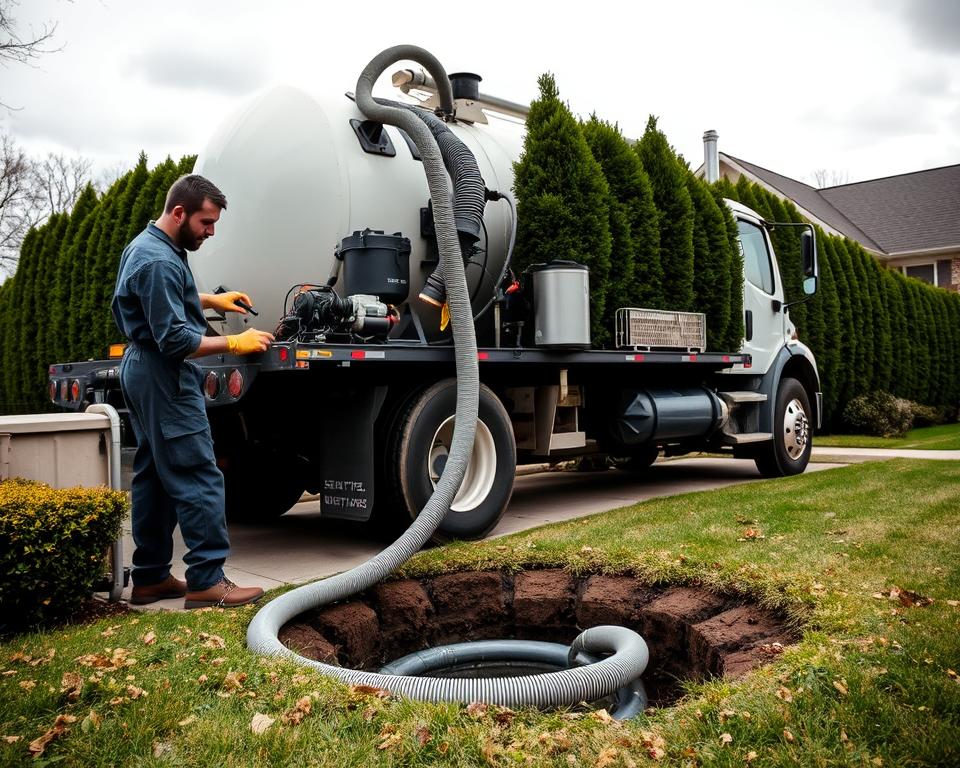Replacing a Septic Tank Pump: Your Guide
Have you ever thought about the aftermath of a Septic Tank Pump malfunction? For many, it’s a event that brings significant worry and sudden financial hits. Realizing the necessity for quick replacement is critical in maintaining a working and clean Septic system. By observing periodic check-ups, including swift repair needs, you prolong your system’s life while sidestepping costly emergencies. Companies like All in Sanitation play a crucial duty in helping keep your Septic tank operating smoothly. This guide aims to provide a clear explanation of Septic Tank Pump replacement, including alert signals and upkeep suggestions for septic pumping.
Noteworthy Points
- Knowing the function of a Septic Tank Pump is crucial for homeowners.
- Timely Septic Tank Pump replacement can lower overall spending.
- Scheduled maintenance and cleaning are important to increasing the lifespan of your Septic system.
- Qualified service can competently oversee Septic system Pump repair and maintenance.
- Spotting early signs of Pump failure can help prevent costly repairs.
Understanding Your Septic System
A Septic system is vital for homes without access to city sewer lines. It manages household wastewater responsibly. The Septic tank is integral to this system’s performance, holding a pivotal position in the process.
The Septic tank receives sewage, splitting solids from lighter materials. This segregation is crucial for effective wastewater treatment. The clarified water then moves to the drain field, where it experiences further purification by the soil, protecting groundwater.
Understanding how your Septic system functions can extend its life and efficiency. Regular upkeep is critical for the Septic tank and the system’s overall condition. Homeowners must know their system’s specifics to prevent harm to the environment and bypass costly repairs.
What is a Septic Tank?
A Septic tank is a in-ground, watertight container central to household waste management systems. It’s vital to grasp the Septic tank’s main function: it deals with sewage waste storage by treating it. This setup operates by separating solids from liquids, enabling basic wastewater treatment and sanitation.
Its operation depends on naturally occurring microorganisms that process waste. In locales without centralized sewage treatment, Septic tanks are indispensable. They retain sewage long enough for solids to settle, forming sludge. Meanwhile, liquid effluent rises to the top, setting the stage for filtration in the drainage field.
Maintaining a Septic tank in optimal state is vital for its efficiency and life expectancy. Consistent servicing is central to avoiding problems like backups and overflows. These situations can bring about high bills and pose risks to the environment. In essence, Septic tanks are indispensable in ensuring hygiene and safety, especially in rural areas.

How to Tell a Pump Needs Replacing
Homeowners should be alert of signs that their Septic tank may need a new Pump. A noticeable sign is experiencing foul odors around drains or in the outdoor area, signaling a system failure. Dealing with recurring or serious sewage backups in your home demands swift action to avoid worse issues.
Detecting slow draining drains points to a potential problem. Household fixtures that clear slowly might signal a Pump failure or a clog that needs an expert’s evaluation. Additionally, spots of remarkably lush vegetation in your yard could signal trouble; this suggests waste leakage, creating overflow concerns.
To ward off major and expensive repairs, homeowners should deal with these indications quickly. Scheduling regular inspections and maintenance is essential for the Septic system’s optimal function.
| Signs | Description |
|---|---|
| Foul Odors | Unpleasant smells around drains or yard indicating system failure. |
| Sewage Backup | Regular sewage returns in sinks or toilets suggesting potential Pump issues. |
| Slow Draining Drains | Fixtures draining slowly can mean blockages or Pump malfunction. |
| Lush Vegetation | Areas of dense greenery near the tank indicating possible overflow. |
When to Change Your Pump
Understanding the frequency for replacing your Septic Pump is crucial for a reliable Septic system. It’s wise to have your system reviewed every three years. A certified technician during these inspections provides information into how well your system runs.
In most cases, emptying the Septic tank becomes essential every five years. However, households with extensive use or a big family might need annual service. Correct upkeep of your Septic system thwarts pricey work and prolongs its lifespan. Technicians in Septic services can create a maintenance plan that aligns with your household load and the specifics of your system.
Keeping on top with Septic Pump replacements maintains your system’s smooth running and protects your home investment. Consistent checks and care dodge sudden bills. They keep your Septic system working smoothly.
Pump Replacement Pricing
The Septic Pump replacement cost varies, influenced by many elements. Homeowners should budget for an amount of $500 to $1,300 for a new Pump. This price spectrum reflects differences in the model of Pump and material needs. It’s crucial to consider the Pump and Septic tank servicing costs for the placement and necessary inspections.
Costs can also rise due to issues within the Septic system or local wage levels. Necessary repairs, caused by wear or harm, could inflate the total outlay. In reviewing financial estimates for Septic services, include charges for scheduled service, assessments, and any emergency calls since these factors are vital for maintaining your system’s longevity.
Allocating funds for periodic Septic service minimizes the shock of sudden charges. Proactive budgeting supports property owners in managing expenses related to the Pump’s replacement and system upkeep.
Pump Replacement Procedure
The Septic Tank Pump replacement starts with a thorough inspection of the system. This preliminary check finds any additional issues aside from the Pump itself. The faulty Pump is then taken out safely and swiftly.
Installing the new Pump demands exact care to leak-free joints, ensuring no leaks. Qualified technicians see that the installation is done correctly, minimizing future issues.
The concluding phase is a complete wrap-up review. It confirms optimal performance, offering homeowners assurance. With expert help, the process is straightforward, causing minimal disruption.
Best Practices for Installation
When undertaking Septic Pump installation, it’s critical to follow best practices. Bringing in licensed contractors confirms compliance with local regulations. They competently oversee the installation complexities, eliminating errors common in inexperienced setups.
Sticking to precise Septic service standards is crucial for integrated function. Opting for proper parts and durable materials extends the Pump’s life and enhances the Septic system’s efficiency. This precise approach elevates maintenance and overall performance longevity.
- Select a trusted service provider who focuses in Septic systems.
- Verify that all necessary permits and inspections are in place before work begins.
- Install Pumps that suit the specific requirements of your Septic system.
- Schedule a pre-installation inspection to review site conditions.
- Pay attention to the layout and flow of the Septic system during installation.
Following these guidelines creates a smooth installation process. It also secures a steady system for effective waste management.
Maintenance Advice
Preventing expensive issues with your Septic system commences with routine care. By employing easy guidelines, homeowners can preserve their Septic systems’ efficiency. Arranging periodic reviews is a smart move. It detects and tackle problems before they become significant.
It’s also crucial to not allow flushing damaging substances down the drain. Grease, chemicals, and items that don’t break down can impair your system. Lowering water use during heavy-demand hours can also improve system handling.
Scheduling expert services with entities like All in Sanitation is vital for Septic health. Knowing what you should and shouldn’t do with your Septic tank can dramatically prolong its lifespan and secure your household environment.
Understanding Cleaning Services
Routine Septic tank cleaning is vital for your system’s long-term function and efficiency. The process involves clearing sludge, checking for damages, and verifying everything runs smoothly. These steps are necessary to maintain smooth operation and prevent pricey problems.
A comprehensive Septic maintenance plan should feature regular inspections and cleanings that match your specific usage. Homeowners must appreciate the importance of timely maintenance to prevent issues like backups. Bringing in pros confirms the cleaning is comprehensive, encouraging a hygienic home.
| Service Type | Frequency | Benefits |
|---|---|---|
| Pumping | Every 3-5 years | Stops system failure and backups |
| Inspection | Annually | Spots potential issues early |
| Maintenance | As needed | Prolongs the lifespan of the system |
Putting money into periodic Septic tank cleaning cuts costs and increases your system’s life. It supports uninterrupted waste treatment. Acting now safeguards your Septic system’s efficiency for the future.
Selecting the Right Service
Finding a trustworthy Septic service provider is vital when replacing a Septic Tank Pump. Start by ensuring their certifications and licenses. Such credentials prove the company’s compliance with industry norms, necessary for a smooth replacement process.
Delving into customer reviews is also a smart idea. Past feedback indicates service quality, helping with the filtering process. Opt for companies with a consistent track record of excellent workmanship and customer support.
Acknowledge recommendations from your network too. Insights from friends and neighbors can reveal top-notch Septic services in your vicinity. Always get detailed instances of their good results with these services.
Finally, assess the offering and cost from various firms. A careful analysis ensures exceptional service and improves the value of your expenditure. Keeping to these guidelines guarantees your Septic system receives the premium care it deserves.
DIY vs. Professional Service
Homeowners often wonder whether to tackle Septic issues alone or hire specialists. DIY Septic maintenance looks attractive for minor fixes and upkeep. For example, monitoring Septic tank levels or cleaning drains can be done without expert intervention.
On the other hand, recognizing when to hire Septic professionals is important for major faults. Heavy-duty repairs, replacing systems, or major clogs demand specialized gear and know-how. Without the necessary skills, attempts to repair these problems can cause environmental risks and large-scale damage.
Deciding between DIY and professional help calls for evaluating the job’s complexity. Presented below are examples highlighting when DIY is adequate and when professional Septic services are recommended:
| Situation | DIY Feasibility | Need for Professional Help |
|---|---|---|
| Routine maintenance (e.g., tank level checks) | Yes | No |
| Minor clogs in drain fields | Yes | No |
| Major Septic Tank Pump failure | No | Yes |
| Complex sewage backflow issues | No | Yes |
| Regular system inspections | Consider DIY | Yes for thorough checks |
Acting knowledgeably on these matters guarantees safety and efficiency. Choosing correctly not only protects the Septic system but also avoids surprise expenses.
In Summary
Grasping the workings of your Septic system is crucial for its effective management and your home’s performance. Identifying first symptoms of issues heads off expensive repair costs and maintains the system’s health. This forward-thinking approach supports the environment and enhances your property value.
To keep your Septic system in prime condition, focus on maintenance. This means consistent assessments and on-time professional Pumping. This small outlay maintains your home’s safety and your family’s health. Your Septic system operates smoothly with adequate service.
Our team at All in Sanitation is dedicated to supplying high-quality Septic care. We deliver the expertise essential to maintain your system operating efficiently, defending your home investment over time. With our dedication to outstanding care and reliability, we’re ready to meet your Septic maintenance needs.


